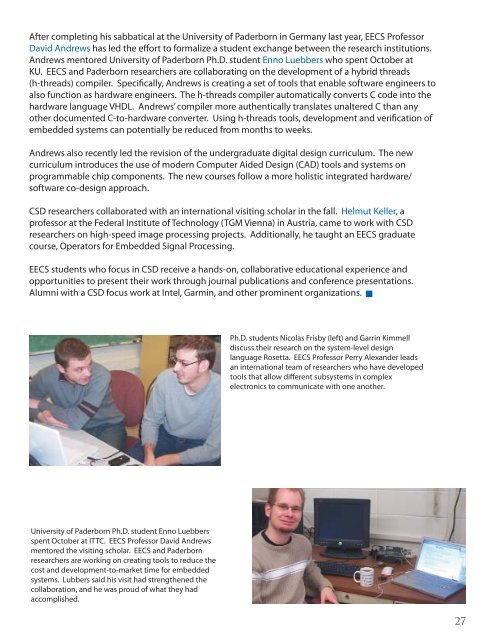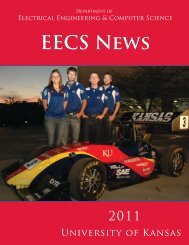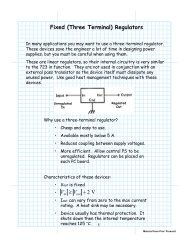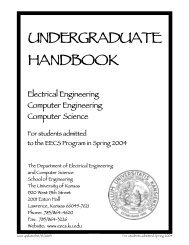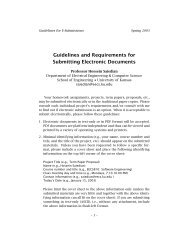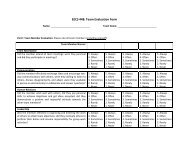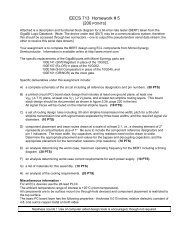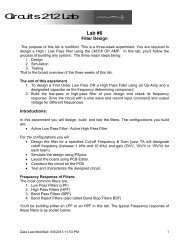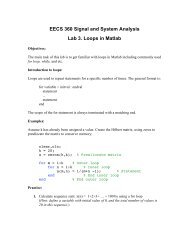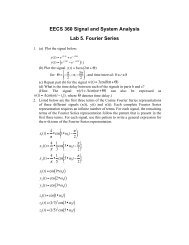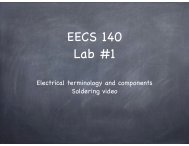EECS News Final 1.30.indd - Electrical Engineering and Computer ...
EECS News Final 1.30.indd - Electrical Engineering and Computer ...
EECS News Final 1.30.indd - Electrical Engineering and Computer ...
You also want an ePaper? Increase the reach of your titles
YUMPU automatically turns print PDFs into web optimized ePapers that Google loves.
After completing his sabbatical at the University of Paderborn in Germany last year, <strong>EECS</strong> Professor<br />
David Andrews has led the effort to formalize a student exchange between the research institutions.<br />
Andrews mentored University of Paderborn Ph.D. student Enno Luebbers who spent October at<br />
KU. <strong>EECS</strong> <strong>and</strong> Paderborn researchers are collaborating on the development of a hybrid threads<br />
(h-threads) compiler. Specifically, Andrews is creating a set of tools that enable software engineers to<br />
also function as hardware engineers. The h-threads compiler automatically converts C code into the<br />
hardware language VHDL. Andrews’ compiler more authentically translates unaltered C than any<br />
other documented C-to-hardware converter. Using h-threads tools, development <strong>and</strong> verification of<br />
embedded systems can potentially be reduced from months to weeks.<br />
Andrews also recently led the revision of the undergraduate digital design curriculum. The new<br />
curriculum introduces the use of modern <strong>Computer</strong> Aided Design (CAD) tools <strong>and</strong> systems on<br />
programmable chip components. The new courses follow a more holistic integrated hardware/<br />
software co-design approach.<br />
CSD researchers collaborated with an international visiting scholar in the fall. Helmut Keller, a<br />
professor at the Federal Institute of Technology (TGM Vienna) in Austria, came to work with CSD<br />
researchers on high-speed image processing projects. Additionally, he taught an <strong>EECS</strong> graduate<br />
course, Operators for Embedded Signal Processing.<br />
<strong>EECS</strong> students who focus in CSD receive a h<strong>and</strong>s-on, collaborative educational experience <strong>and</strong><br />
opportunities to present their work through journal publications <strong>and</strong> conference presentations.<br />
Alumni with a CSD focus work at Intel, Garmin, <strong>and</strong> other prominent organizations. <br />
Ph.D. students Nicolas Frisby (left) <strong>and</strong> Garrin Kimmell<br />
discuss their research on the system-level design<br />
language Rosetta. <strong>EECS</strong> Professor Perry Alex<strong>and</strong>er leads<br />
an international team of researchers who have developed<br />
tools that allow different subsystems in complex<br />
electronics to communicate with one another.<br />
University of Paderborn Ph.D. student Enno Luebbers<br />
spent October at ITTC. <strong>EECS</strong> Professor David Andrews<br />
mentored the visiting scholar. <strong>EECS</strong> <strong>and</strong> Paderborn<br />
researchers are working on creating tools to reduce the<br />
cost <strong>and</strong> development-to-market time for embedded<br />
systems. Lubbers said his visit had strengthened the<br />
collaboration, <strong>and</strong> he was proud of what they had<br />
accomplished.<br />
27


